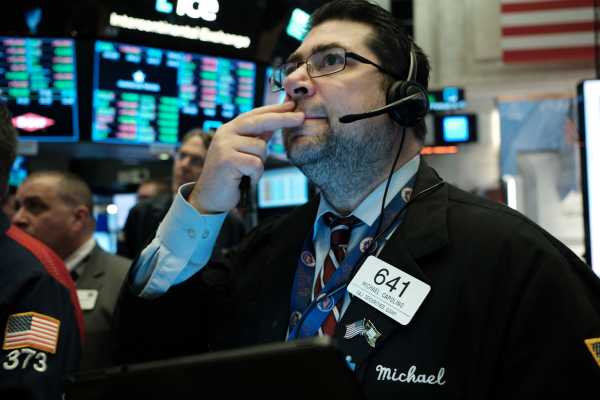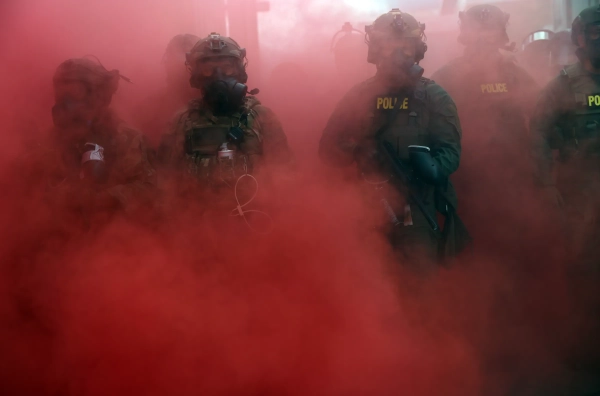
The stock market has been in a free fall the last week or so as fears around the coronavirus spread across the global economy. And today, after President Trump announced his travel ban last night, stocks plunged once again.
If you don’t follow the market that closely, or if you don’t understand how it works more generally, it’s hard to know what to make of this volatility. But the uncertainty raises a ton of questions, whether you’re invested in the stock market or not.
Is a recession looming? How will this impact the average worker? Are we doing anything to fix it? And above all, will it get worse?
To get some answers, I reached out to Claudia Sahm, a former Federal Reserve staff economist who’s now with the Washington Center on Equitable Growth. She’s an expert on recessions — what triggers them and what stabilizes them — and a lot of her research explores the efficacy of previous stimulus programs.
We discussed if the economic fallout from the coronavirus will hit some regions of the country harder than others, if the stock market is causing our problems or just a sign of them, and if the Trump administration is doing anything to stop the financial bleeding.
A lightly edited transcript of our conversation follows.
Sean Illing
What is going in on with the economy right now?
Claudia Sahm
The economy is reacting to the coronavirus. As of [Wednesday] morning, stock prices were down almost 20 percent. And this is just from three weeks ago. This is a very rapid contraction and we’re flirting with what’s called a bear market. That’s where you hit the 20 percent mark. This is a very swift descent and a sign that we’re in a frightening economic situation.
I want to add one thing about stock prices, because we’ve seen them jump up and down and the markets are gyrating at this point. The markets are telling us a few things. The most important thing is that they don’t know what’s going on, and these are professionals who are supposed to know what’s going on. But this makes sense since there’s a lot of uncertainty about how the crisis will unfold.
What we know is that the virus is spreading in the US and we’ve seen countries like China use authoritarian measures to get it under control. We now have Italy shutting down its entire country, and the death rates in Italy are well above what has been reported in other countries. So events are moving quickly and anybody that tells you that they know what the hell is going on is lying.
Sean Illing
Can you explain why the stock market is so volatile in moments like this?
Claudia Sahm
Stock prices don’t reflect what’s happening in the economy today. They’re looking forward.
The stock prices us about the expectations of people on Wall Street, and they’re looking closely at consumer confidence numbers. They’re looking at surveys telling them what people expect to happen to their household finances, what they expect to happen with their employment and income. These are the sorts of data points they’re looking at because they point to what’s likely to happen in the future.
None of this is certain. These are indications of what’s most likely, but it’s ultimately a guessing game.
“We’ve seen this before and it can lead to a recession”
Sean Illing
This feels a bit like a self-fulfilling prophecy. Is the stock market causing problems, or is it just a sign of problems that already exist?
Claudia Sahm
It’s a very important question. This is the sort of downward spiral that brings the economy into a recession. We’ve seen it time and again, especially with natural disasters like the coronavirus.
So when you think about a hurricane hitting the country, it disrupts economic activity, especially where the hurricane hits, but then it gets better. It’s temporary. There’s destruction in a particular area that causes lots of distress, but eventually we bounce back. But the coronavirus isn’t a hurricane. It’s not something that rolls through in a few days and then we start rebuilding. This is a spreading sickness and a potentially months-long disruption.
There are many households in the economy that are one paycheck away from serious financial distress. And right now what’s so scary for those people is that they don’t know if they’re going to get sick. They don’t know if their companies or employers are going to put them on furlough without pay. And even if the virus turns out not to be as severe as we think, much of the damage will be done. It’s being done right now, and families don’t recover easily from that.
We’ve seen this before and it can lead to a recession. And that’s what we’re on track for unless there is a very immediate and very big policy response.
Sean Illing
We’ll get to what that response ought to look like, but first can you tell me how worried the average person should be? Is this a navigable problem, or is it a genuine economic crisis?
Claudia Sahm
It’s the real deal. And Americans know this. That’s why we’ve seen markets collapse. American families are getting increasingly worried about whether they’re going to get sick, whether they’ll lose paychecks, whether they’ll be able to provide for their families. And things are a lot more real than they were a few weeks ago.
Sean Illing
Should we expect the economic impact of the pandemic to hit different regions of the country in different ways?
Claudia Sahm
Well, we know where the virus is spreading the fastest — in Washington State and areas of New York right now. So we need to be watching the economic activity in those areas very closely, because if it’s temporary, if it doesn’t spiral, we can take some comfort from that. But we still need to step in and help the people who are directly affected.
I am deeply concerned that what we’re going to see in those areas is not a temporary effect but a long-term effect, and then that will spread across the country as the virus spreads. And then we’re in a recession.
Sean Illing
What should the government be doing? What sorts of policies should we prioritize?
Claudia Sahm
I think there are two approaches that we need to see. One, there has to be a public health response. The federal government needs to put hundreds of billions of dollars out to public health. We need to see free testing available to individuals. We don’t want anybody that doesn’t have health insurance to avoid the doctor if they feel sick. And people who can’t work, for whatever reason, need to have paid family leave. They need to have their jobs protected.
But then you’d have the paychecks protected, too. We need federal government money that should be very specifically earmarked for people directly affected by the virus.
In addition, because we have this downward spiral taking hold, there needs to be support for consumers and businesses because everyone’s freaking out. The fact that no one knows who’s going to be affected is making it worse, so everyone is pulling back on their spending.
“Events are moving quickly and anybody that tells you that they know what the hell is going on is lying”
Sean Illing
The Trump administration is considering a payroll tax cut. Is that a good idea?
Claudia Sahm
It’s a terrible idea.
Sean Illing
Why?
Claudia Sahm
It doesn’t work. It’s too little and it’s not going to move fast enough. And I say this because in the last decade that I worked at the Federal Reserve Board as a forecaster, I tracked the effects of the payroll tax cut on households in real time and it doesn’t work well.
First of all, it comes out in dribs and drabs. You’re going to get a little bit in every paycheck. President Trump has talked about that little boost to paychecks happening through the end of the year. He doesn’t want a tax increase before the election. But households don’t need $25 in the next two weeks, or $50 in the next four weeks. They need $500 right now, because if you wait and you put it out in these little increments, it’s no good to people who end up losing their job or getting sent home without pay.
We have the ability, since the virus is not affecting broad areas of the country right now, to get ahead of it. If we can push out to these workers a sizable amount of money, then that gives them some financial cushion if they do end up being in this group of individuals who are directly affected.
Sourse: vox.com






